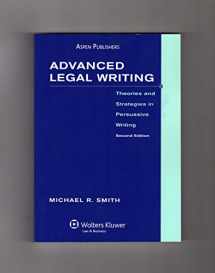
Advanced Legal Writing: Theories & Strategies in Persuasive Writing
ISBN-13:
9780735556591
ISBN-10:
0735556598
Edition:
2
Author:
Michael R Smith
Publication date:
2008
Publisher:
Aspen Publishers, Inc.
Format:
Paperback
388 pages
FREE US shipping
Book details
ISBN-13:
9780735556591
ISBN-10:
0735556598
Edition:
2
Author:
Michael R Smith
Publication date:
2008
Publisher:
Aspen Publishers, Inc.
Format:
Paperback
388 pages
Summary
Advanced Legal Writing: Theories & Strategies in Persuasive Writing (ISBN-13: 9780735556591 and ISBN-10: 0735556598), written by authors
Michael R Smith, was published by Aspen Publishers, Inc. in 2008.
With an overall rating of 3.7 stars, it's a notable title among other
books. You can easily purchase or rent Advanced Legal Writing: Theories & Strategies in Persuasive Writing (Paperback) from BooksRun,
along with many other new and used
books
and textbooks.
And, if you're looking to sell your copy, our current buyback offer is $0.3.
Description
With a practical focus on persuasive writing strategy, Michael R. Smith identifies and explores three processes of persuasive writing—logos, pathos, and ethos—and provides a thorough introduction to the elements of rhetorical style.
Using detailed how-to guides and plenty of examples, the author’s distinctive approach to persuasive writing examines:
- technical aspects of rhetorical style: metaphor, literary allusion, figures of speech, and graphic design
- three basic processes of persuasive legal writing strategy:
- Logos: logic and rational argument
- Pathos: value-based argument
- Ethos: establishing credibility
- interdisciplinary contributions to persuasive writing from fields such as cognitive psychology, classical rhetoric, and morality theory
- effective strategies that extend beyond the trial or appellate brief to a broad range of documents and settings
In the Second Edition, the reader will find:
- a new organization that puts a greater emphasis on practice and relatively less on theory for each of the three processes of persuasive writing strategy
- a new six-Part organization:
- I. Introduction
- II. Logos Strategies
- III. Pathos Strategies
- IV. Ethos Strategies
- V. Rhetorical Style
- VI. The Ethics and Morality of Persuasion
- coverage of new developments in cognitive psychology, Pathos persuasion, and the role of metaphor in persuasive legal writing.
- the same manageable length
For a complete examination of the technique and strategy behind persuasive writing, Smith’s text strikes the right balance of depth and scope for upper-level legal writing courses.


We would LOVE it if you could help us and other readers by reviewing the book
Book review

Congratulations! We have received your book review.
{user}
{createdAt}
by {truncated_author}


